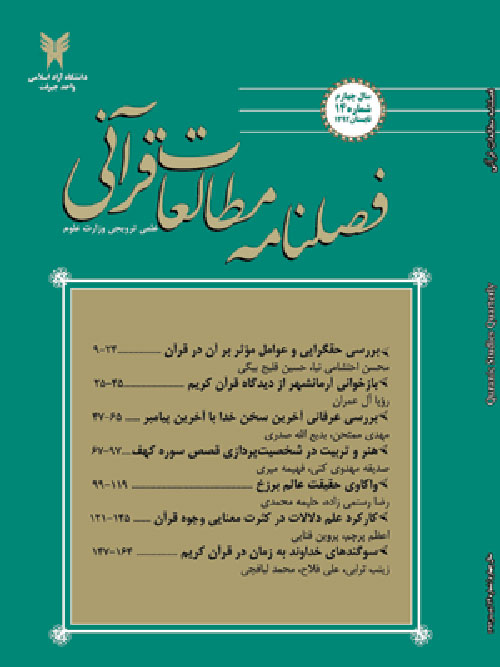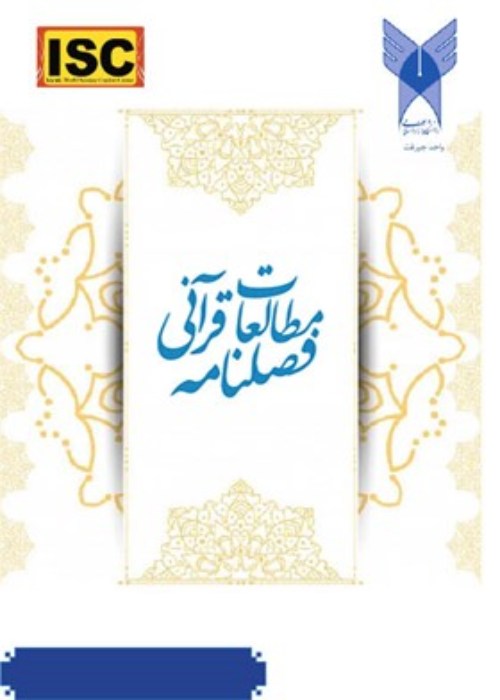فهرست مطالب

فصلنامه مطالعات قرآنی
پیاپی 14 (تابستان 1392)
- تاریخ انتشار: 1392/06/19
- تعداد عناوین: 7
-
-
صفحات 9-24در طول تاریخ همواره افراد در مواجهه با حق به دو دسته تقسیم شده اند؛ عده ای آن را پذیرفته و عده ای آن را انکار و رد می کردند. براساس آیات و روایات معصومین(علیهم السلام)، زمینه ها و عوامل گوناگونی وجود دارد که هرکدام می تواند در پذیرش حق و یا انک ار آن تاثیرگذار باشد . برای بررسی دقیق تر و روشن ترشدن موضوع این زمینه ها و عوامل را به دو نوع درونی و بیرونی نسبت به وجود انسان تقسیم شده، که در این مقاله عوامل بیرونی تاثیرگذار در پذیرش و انکار حق بررسی می شود. این عوامل گوناگون اند ولی در نهایت اگر انسان فطرت خود را سالم نگه دارد، و حجابی برای عقل خویش ایجاد نکند پذیرای حق است، ولی اگر به هر دلیلی از عقل سالم و فطرت الهی فاصله بگیرد، به همان اندازه از حق دور شده و زمینه را برای انکار حق آماده ساخته است. در این مقاله به بررسی این عوامل می پردازیم.کلیدواژگان: حق و باطل، انبیای الهی، شیطان، ثروت، اجبار
-
صفحات 25-46هدف پژوهش حاضر بازخوانی « آرمان شهر » از دیدگاه قرآن کریم است. بر این اساس مطالعه حاضر با مطالعه روی 81 آیه از آن که شامل واژه های مرتبط با شهر هستند، و با استناد به تفسیر معیارهای شهر آرمانی از دیدگاه قرآن کریم را با استفاده از روش تحلیل محتوا به ،« المیزان » دست آورده است. نتایج پژوهش حاکی از آن است که از نظر قرآن، جامعه مطلوبی وجود دارد که در پناه پروردگار یگانه و با هدف مشخص شکل می گیرد. در این میان تمدن اسلامی به دلیل دارا بودن ویژگی های خاص و منحصر به فرد، چهره خاصی از آرمان شهر مطلوب ترسیم کرده، و در نگاهی کلی باید گفت که قرآن کریم آکنده از اصول و دستورات اخلاقی است که بر اساس آن می توان بهترین و دقیق ترین برنامه و سیستم را برای جامعه اخلاقی مطلوب پی ریزی کرد.کلیدواژگان: قرآن کریم، تفسیر المیزان، آرمان شهر، نظام اخلاقی، افلاطون
-
صفحات 47-64قرآن کتابی است سراپا بشارت و انذار که حاوی خطابات و اشارات عالی قدر عرفانی است . از جمله آیه 281 سوره بقره: « و اتقو یوما ترجعون فیه الی الله ثم توفی کل نفس ما کسبت وهم لا یظلمون » که طبق اقوال و استناد مفسران بسیاری، آخرین آی های است که بر پیامبر نازل گشته است. این نوشتار با روشی اسنادی- توصیفی به بررسی چند واژ ه کلیدی این آیه پرداخته و ارتباط تقوا با مقامات، احوال و معانی عرفانی را بیان می کند. هدف اصلی این نوشتار تبیین ابعاد آخرین سخن خدا، تقوا، یوم، موت، ظلم، مراقبه، محاسبه.و زوایای واژه های این آیه، با تکیه بر اقوال تفاسیر و متون عرفانی است.کلیدواژگان: آخرین سخن خدا، تقوا، یوم، موت، ظلم، مراقبه، محاسبه
-
صفحات 67-97سوره کهف از جمله سوری است که چهار قصه را در خود جای داده است: قصه اصحاب کهف ، قصه صاحب دو باغ، قصه موسی(علیه السلام) و عبد صالح، و قصه ذوالقرنین؛ با دقت در قصص سوره می توان دریافت هر قصه متشکل از شخصی تهایی است که برخی دارای نقش اصلی و پررنگ، و برخی دارای نقش فرعی و کم رنگ هستند که در کنار، یا مقابل هم سبب حرکت و معرفی فضای داستان شده اند. این مقاله بر آن است تا با توجه به سبک متفاوت این سوره با سور مشابه، و هم چنین اهمیت نقش قهرمان و ضد قهرمان در هر داستان، به ترسیم شخصیت ها از دو بعد هنری و تربیتی بپردازد.کلیدواژگان: سوره کهف، عناصر داستانی، تربیت، اصحاب کهف، ذوالقرنین، قصص قرآن
-
صفحات 99-119خداوند در قرآن از زاویه های مختلف به مسئله حیات پس از مرگ، عالم برزخ و جهان آخرت پرداخته است؛ از این میان می توان حداقل بیست آیه را یافت که بر جهان برزخی دلالت دارد و از مجموع این آیات حقیقت وجود عالم برزخ تا حد زیادی روشن می شود. این پژوهش در صدد بررسی عالم برزخ در آیات مذکور است، که از یک طرف ذهن مخاطب را به حقیقت عالم برزخ متوجه می کند، و از طرف دیگر در ساماندهی اعمال و رفتارش که تعیین کننده وضعیت او در عالم برزخ است نقشی اساسی دارد؛ لذا در این راستا به مفهوم شناسی برزخ، تفسیر، شرح و توضیح آیات مربوط به این موضوع، فلسفه برزخ، و در نهایت بهشت و جهنم برزخی و تفاوت آن با بهشت و جهنم رستاخیز به منظور بیان حالت های آن عالم اشاره می شود.کلیدواژگان: قرآن، دنیا، برزخ، جهنم برزخی، بهشت برزخی
-
صفحات 121-145مراد از « علم وجوه قرآن » معنای موضوع له واژه ها نیست، بلکه معنای کاربردی یا مستعمل فیه آن ها است. به این معنا که واژ ه ها در بافت و سیاق آیات به صورت مصادیق و معانی مختلف حقیقی، مجازی و یا کنایه ای، و نیز به نحو اشتراک لفظی و غالبا به شیوه اشتراک معنوی به کار می روند. اینگونه کاربردها در دانش وجوه موجود است ولی هیچ کدام از منابع وجوه در بیان معانی و مصادیق واژه ها به نوع دلالات الفاظ و به شاهد لغوی و سیاقی آن ها نپرداخت هاند. مقاله حاضر در صدد تبیین این موضوع در آیاتی چند از واژه های ظلم و فسق و طغیان است.کلیدواژگان: علم وجوه، معناشناسی، مشترک معنوی، ظلم، فسق، طغیان
-
صفحات 147-164نگاه علمی و فرهنگی به قرآن کریم به عنوان دیدگاهی والا و متاثر از فرهنگ ناب اسلامی، راهکار ارزنده ای است که با اعطای بینش و نگرشی دینی به مفسران و قرآن پژوهان، برآن است تا زوایای گوناگون کتاب وحی الهی را بر تمامی ره پویان فرهنگ و معارف اسلامی آشکار نماید . آنچه در این جستار بدان پرداخته خواهد شد، بررسی آیات شریفه ای از قرآن کریم است که سوگندهای خداوند به بخش های مختلف زمان را در بر می گیرد. هدف مقاله حاضر بررسی و تبیین یکی از عرصه های آموزنده قرآن کریم است که متضمن سوگندهای عبرت آموز خداوند به مصادیق مختلف زمان می باشد.کلیدواژگان: سوگند خداوند، عناصر زمان، قرآن کریم، صبح، عصر، فجر
-
Pages 25-46We aimed to refresh the view of the Quran in the ideal town. Accordingly, this paper, by studying 81 verses of the Holy Quran relating to urbanism and referring Al-Mizan interpretation, measures the utopian city of the Holy Quran using content analysis method. The results of the study indicate that there is a good community from the view of the Quran for which a unique characteristic is mentioned and that is formed in Gods refuge with a distinct goal. The Islamic civilization due to its unique properties, has drawn certain figure from the desirable utopia.And this can be said that the Holy Quran is replete with ethical principles and rules which can be the best and most accurate program of good ethical system of a society.Keywords: The Holy Quran, Al, Mizan Interpretation, Utopia
-
Pages 47-64The Holy Quran is a book full of threatening and promising and secret truths and it contains various verses that embodies valuable mystical indications including the verse 2:281, which says"be afraid of the day you are returned to God and then everyone is given what s/he has acquired and nobody will be treated unjustly" that is said to be the last verse which is revealed to Muhammad(pbuh); So, I have tried to explain this verse on the basis of the mystical exegeses of the Holy Quran and made some attempts to come to some useful conclusions. Furthermore one of the axes in this verse refers to God and death, which is traditionally seen as an important aspect that we face. The main objective of this paper is to explain the dimensions and angles of the words in this verse commentaries on the sayings and mystical texts; and it is trying to achieve beneficial results in this field.Keywords: The last divine words, Fear, day, death, Meditation, Enquiry
-
Pages 67-97Surat Kahf is among the Surats that include four stories: Story of the Friends of the cave, the story of the owner of two gardens, the story of Moses (peace be upon him) and Abd-e-Saleh and Zulqarnain story; If we pay a close attention to this Surat, we can find that each chapter consists of characters.Some have highlighted role and some minor roles and are alongside or against each other, cause the motion and introduction of the story conditions.This article is based on a different style according to this Surat and the role of hero and anti-hero in each story and it tries to draw the characters from both the artistic and educational views.Keywords: Surat Al Cave, story elements, Education, the Friends of the Cave
-
Pages 99-119God in the Quran has noticed the life after death, the hereafter and the intermediary world from different aspects. Referring to the Quran, we can find at least twenty verses that imply the intermediary world.And from the sum of these verses, it goes clear the reality of the intermediary world.This study seeks to examine the intermediary world in the above verses.That, on one hand, attracts the audiences mind to the truth of the intermediary world; and on the other hand, by managing their actions and behavior that affect his status in intermediary world, let them think about the basic measures. Therefore, in this context, the concept of intermediary world, interpretation, explanation of the verses relating to this subject, philosophy of the intermediary world, and eventually intermediary Heaven and Hell and its differences with the Heaven and Hill of the resurrection are mentioned in order to express the state of that world.Keywords: the Quran, the World, Purgatory, Purgatory Hell, Purgatory Heaven
-
Pages 121-145The mean sing of the Qurans aspects is not their lexical meaning but their practical meaning.Words in the Quranic context are used as different examples of real, virtual, allegoric and irony meanings and also in the form of shared verbal and semantic way. This kind of applications exists in the science of aspects. But none of the sources of the existing references has dealt with explaining the meanings and the examples of the words and the kind of their connotations.This paper seeks to explain the words cruelty and immorality and rebellion in some verses.Keywords: Science of Aspects, Semantics, Implification, Immorality, rebellion
-
Pages 147-164Scientific and cultural look to the holy Quran, as a noble vision and influenced by the pure Islamic culture, is a valuable approach that by granting religious insight and attitude to the Quran commentators and scholars, intends to make clear the different perspectives of God's divine messages to all followers of Islamic culture and studies. Investigation into the verses from the Quran that involved the God's swear by the various parts
is what will be addressed in this essay. The present article aims to investigate and explicate one of the informative aspects of the Quran that involves the cautionary swear of God on the different instances of time. This article which includes: God's swear on the evening, swear on the morning, swear on the day, swear on the dawn and swear on the night, is based on different parts of the boarding divisions or time of sunrise and sunset.
Finally, the God's swear by the doomsday has been studied.Keywords: swear, God, time, Holy Quran


